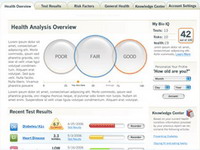Thursday, March 6, 2008
Interview with Justin Bellante, BioIQ

Santa Barbara-based BioIQ (www.bioiq.com) recently closed on $2.5M in funding for the firm's healthcare information technology from Great Pacific Capital, the venture firm run by Dave Gross, founder of Fastclick. We spoke with Justin Bellante, co-founder, President, and CEO of the company, about what it hopes to accomplish with its service.
What's the idea behind your service?

Justin Bellante: BioIQ is really built to connect individuals with consumer friendly diagnostics. We're a health care IT platform and delivery system, that brings consumerized biometrics screening and diagnostics to individuals. We do that first by bringing them diagnostic tests in a way that can be used in the comfort and convenience of their own home, and then allow them to connect to the results online. They can monitor and track their health online, and use other online tools to assess their risk for conditions such as diabetes, heart disease, and cancer.
What kind of testing do you do?
Justin Bellante: We're focused right now on the largest chronic conditions facing the nation right now--diabetes, pre-diabetes, heart disease, colorectal cancer, thyroid cancer, and kidney disease. They are the most prevalent diseases. There are 10 to 20 million people with these conditions. You'll also note that there are lots of undiagnosed cases of these diseases, as much as 1/3 to 2/3 of cases are undiagnosed. That leads to higher severity and more costly treatment down the road. Our goal is to detect and screen for these things early, and identify and monitor them over time.
How would you contrast what you do with the genetic testing services which seem to be so popular nowadays?
Justin Bellante: This isn't predicting or looking at predisposition for a condition. All of our test use evidence-based medical protocols. For example, depending on their demographics certain people should be screened for diabetes or heart disease every year. In essence, we're doing what the medical establishment has been doing, but it's more convenient, and that increases participation. We deal with the individual consumer and at the employer level as well.
Where did the idea for the company come from, and how did it start?
Justin Bellante: My co-founder and I started this after his father passed away. His father had a massive stroke and passed away. When he was in the hospital in a coma, the surgeons explained that he had undiagnosed diabetes, which was a major contributing factor to the stroke. We stepped back, and realized that the top down system doesn't meet the need of an individual. For him to have diabetes no one knew about, and at the same time having diabetes tests out there for as little as $25 to $30, which could have diagnosed his condition and saved his life. We decided to create a system for individuals who were not engaged with the health system, and provide them with the tools, technology, and the medical information out there, and take it to them in a way that they are used to be marketed to, as with any consumer product.
Shouldn't these be the tests your doctor ought to be doing?
Justin Bellante: We don't replace your doctor. The one thing we are trying to do is to get them engaged, and to empower them to screen themselves and learn more about certain health conditions. Of course, they can then take that and follow up with a physician. We're working with a medical advisory board, and this definitely doesn't replace a physician. However, there are many people who don't have the time to go to a physician--they don't have a babysitter, they can't leave work, there are lots of barriers. We break that down by providing an easy test they can do at home--for example, they can prick their finger for a drop, and put that in the mail, which goes to the lab, and get their results online. It also enables an individual to track their health over time, sort of like an online financial portfolio. Our goal is to remove as many barriers as possible to getting engaged with their health.
So what are you doing with the recent funding?
Justin Bellante: We founded the company back in 2005. Our goal then was to go direct to consumers with a launch. In 2006, we started looking at the healthcare industry, and found that several major companies in the U.S. manage the healthcare of just about everyone. We found we were in the position to work with those larger groups to make the biggest impact possible, and started positioning this for employer wellness and screening. What it allows is an employer to quantify the health of their employee population, and understand how they can manage costs with wellness and screening programs. In 2007, we spent our time going out and validating the product and effort, launched a number of pilot programs. In Q4 of 2007, we made some of our initial launches to employers on a larger scale, and started to ramp up our launch and revenues. The funding was brought in to help us start that revenue ramp, and further develop the pipeline we've been building.
Thanks!